#scottish polytheism
Text

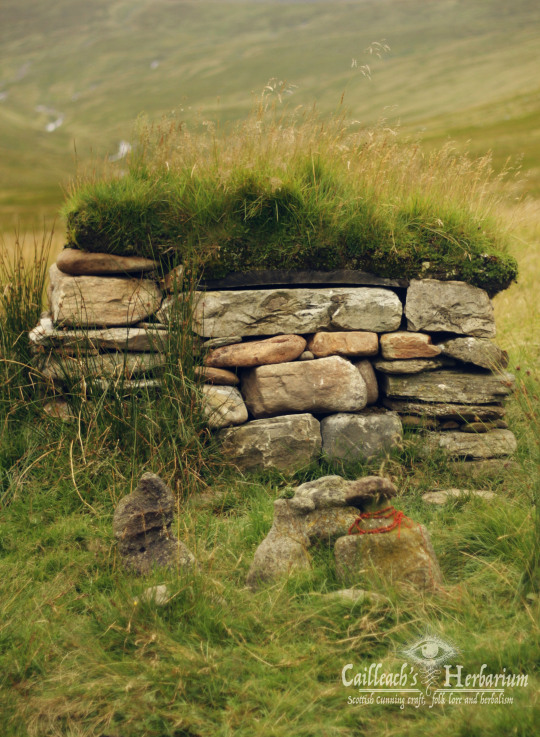
Gleann Cailliche, the valley of the old lady
'The Tigh na bodach houses representations of the Cailleach (old woman) and the Bodach (old man) and their Nighean (daughter) with some smaller statues said to represent other members of this mysterious family. These beautiful arcane looking water worn stones have legends that surround them. Tales I know, tell of a blessing or geas/taboo. Both are perhaps older than those who settled there. The tale recorded, by Dr Anne Ross (1993), follows something like this:
“The fragments … which have survived orally tell of an event which happened ‘many years ago’ when, in an unusually fierce snowstorm, an unnaturally large man and woman were seen coming down the mountain-side of the upper glen. They asked the people who were still settled there for hospitality and shelter. These were willingly given to them. This pleased the supernatural pair well and they took up residence in the glen when the inhabitants had built a thatched house large enough to accommodate them.”
“The woman was pregnant and in due course gave birth to a daughter. The weather was always favourable when they dwelt there. The stock flourished and the crops were always of the best. Then one day the time came when they must go. Before doing so, they promised that as long as they were remembered and their house kept in order, and everything done as they themselves had done it, they would bring it about that winters would be mild, the summers warm, and peace and prosperity would always be with the people who had been so generous to them. In memory of this event of long ago a small shrine in the form of a house was constructed and every Bealtainn the three stones representing the three deities would be taken out of the house and placed facing down the glen. There they remained until the house was re-thatched and made warm and comfortable for the winter and they were returned to the miniature house on the eve of Samhuinn. When the upper glen was flooded and the people moved away”
The two festivals mark the beginning and end of Summer in the old Celtic calendar. The significance to cow farmers is very direct. Bealtainn marked the time when herds were moved out to pasture at the start of summer. They were moved back at Samhuinn, the start of winter. The Cailleach and the Bodach providing blessing through the year to that which people found most precious – their land, cattle, families and clan. (Source)
#the cailleach#scottish polytheism#scottish paganism#scottish mythology#tigh na bodach#Gleann Cailliche
16 notes
·
View notes
Text
Brighid and Bee swarms: I will not molest the swarm queen, nor will the swarm queen molest me.
"Carmichael (1928), in his review of Scottish customs attaching to the Feast of Saint Brigit, speaks of what he calls 'a propitiatory hymn' sung to 'a serpent' which 'is supposed to emerge from it's hollow among the hills on St Bride's Day'. Some of the versions of the 'hymn', describe what emerges from a tom, 'the knoll', as rigen ran, 'a noble queen', and, on the basis of my argument hitherto, I take this to be a clear reference not to any serpent, but rather to the queen bee and, therefore, by implication, to Brigit herself.
La Bride nam brig ban
On the day of Bride of the white hills
Thig an rigen ran a tom
The Noble Queen will com from the Knoll,
Cha bhoin mise ris an rigen ran
I will not molest the Noble Queen,
's cha bhoin an rigen ran rium
Nor will the noble queen molest me.
By way of further support for this reading, an emendation of Carmichael's interpretation of a tom as 'the knoll' can easily be made, substituing for 'knoll', 'round heap', 'conical knoll', 'ant-hill', dictionary definitions of tom (Dwelly, 1918), one or all of which readily could be taken as referring to a bee-nest or bee-hive. Likewise, Carmichael's reading of rigen ran as 'noble queen' may also be open to an interpretation other than that offered by him here: the qualifying element ran, taken by Carmichael to be the adjective ran 'noble', constitutes a suitable soubriquet for a royal personage, to be sure, but it is also a word which might easily be confused with ràn meaning, among other things, 'melancholy cry', 'drawling, dissonant roar or cry' (Dwelly, 1918). Needless to say, the idea of a 'noisy' rather than a 'noble' queen slots in well with the tumult which accompanied swarming according to early writers (...)"
—Hearth-prayers and other traditions of Brigit: Celtic goddess and holy woman. Article by Ó Catháin (Séamas) in JRSAI 122 (1992), pp. 12–34.
#brighid#brigit#saint brigit#carmina gadelica#irish polytheism#irish recon#irish reconstructionism#scottish polytheism#scottish reconstructionism#scottish recon#brighid goddess#celtic recon#celtic polytheism#highlands#quotes#st bride#imbolc#imbolg
4 notes
·
View notes
Text
Witch Journal, Là Fhèille Mìcheil (Michaelmas)
Listen, I'm not Catholic or even come from Catholics, but I find it meaningful to celebrate days that culturally would have been celebrated by my ancestors. Today in Scotland is Michaelmas, a harvest celebration when quarterly rent was paid and folks went for a sunward walk around the church and people ate a special bannock for Saint Michael and a goose and a bunch of other stuff I've got to do way the heck more research on, but here's the point: it honestly that wasn't that hard to do in a modern context!
The day was absolutely lovely, and my sister joined me in my minor celebration. On a whim she decided to make cinnamon rolls for breakfast with plump, oven warm foraged huckleberries, which served as our struan and Saint Michael's bannock. I paid rent early, my sister and I got baked, and then we went for a walk!
There isn't a church near me but there is a public elementary school, which I thought would serve as a suitable replacement for my purposes. Since I was not celebrating the day as a way to celebrate Saint Michael but rather my ancestors, I chose to honor the church in its aspect as community center rather than religious center. We were also supposed to walk sunward, but as I was already high as a freaking kite and children were learning crossing guard duty, I mixed it up with clockwise, remembering that you are never supposed to walk widdershins around a church. It's probably why I'm autistic now, I was changed by fairies back in confirmation
The evening ended with my sister, her boyfriend, and me all playing games together and singing along to Willy Nelson. The only thing we really missed were the gifts and dancing and the goose, but those can come along in the future! In the meantime, my family celebrated an ancestral holiday for the first time in generations!
3 notes
·
View notes
Text
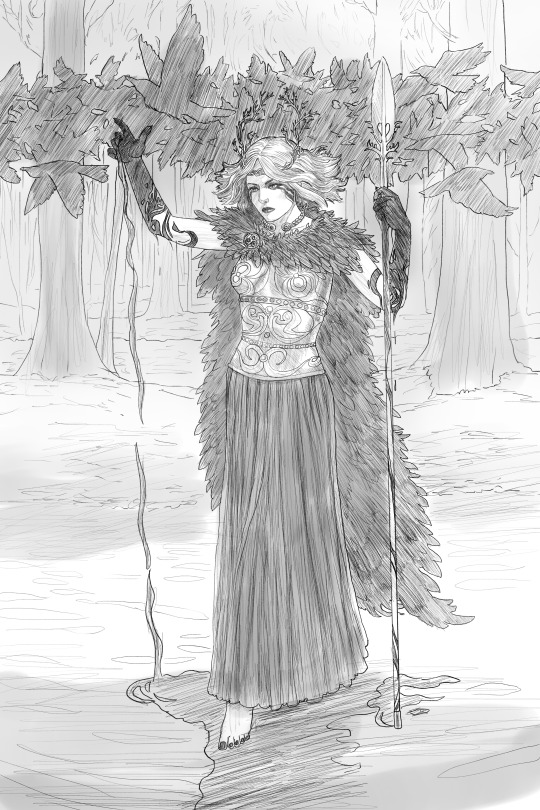
The Morrigan
#celtic#pagan#irish#paganism#scottish#witch#celtic mythology#illustration#art#fantasy#morrigan#the morrigan#pagan witch#war#fate#god#polytheism#tradition#european
208 notes
·
View notes
Text
It'd be cool to come up with Pagan alternatives to the days of the week in the Gaelic languages, since the current ones have such Christian meanings
DiLuain can stay since moon worship is a thing, but perhaps we might change the Latin to "Latha na Gealaich"?
DiMairt could be "Latha na Mhór-ribhinne" (The Morrigan's Day) in keeping with the "M" sound of "Mairt"
DiCiadain needs to go since it refers to a Christian fast, so why not make it Latha an Daghdha? (A sort of oblique reference to Wednesday being "Wodan's Day" in English perhaps?
DiarDaoin again refers to fasts, so maybe "Latha Lùgha"?
DihAoine, another fast, so how about "Latha Aoidh" since it sounds kinda similar to "aoin"?
DiSathairne isn't Christian so much as the wrong kind of pagan, so I'm not against leaving it as is, but as long as we're going with new names, why not "Latha Manannain"?
DiDòmhnaich is perhaps the most explicitly Christian, but since we have "Latha na Gealaich" already, I propose substituting "Latha na Gréine"
I was obviously a bit inspired by the Germanic names here, but I'm curious to see what everyone else's thoughts are! I came up with these off the top of my head, so I make no guarantees about their appropriateness or linguistic accuracy (I'm a Gaelic learner, not a fluent speaker).
#gaelpol#gaelic polytheism#gaelic paganism#scottish gaelic#gàidhlig#gaidhlig#paganism#pagan#an dagda#the morrigan#lugh#aed#manannan mac lir#ireland#irish mythology#gaelic mythology
50 notes
·
View notes
Text
does anyone have any scholarly book recs to learn about the Irish diaspora in North America? bonus points for a focus on folklore and tradition
#iripol#gaelpol#irish paganism#gaelic polytheism#irish polytheism#much appreciated; i simply havent come across what im looking for yet#outside of smaller sources#scottish diaspora id be interested in too
27 notes
·
View notes
Text
Here's to Beltane 2024 🔥
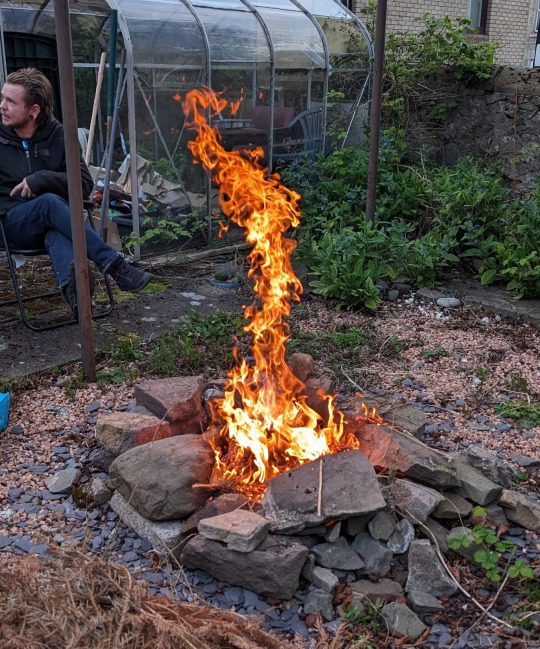
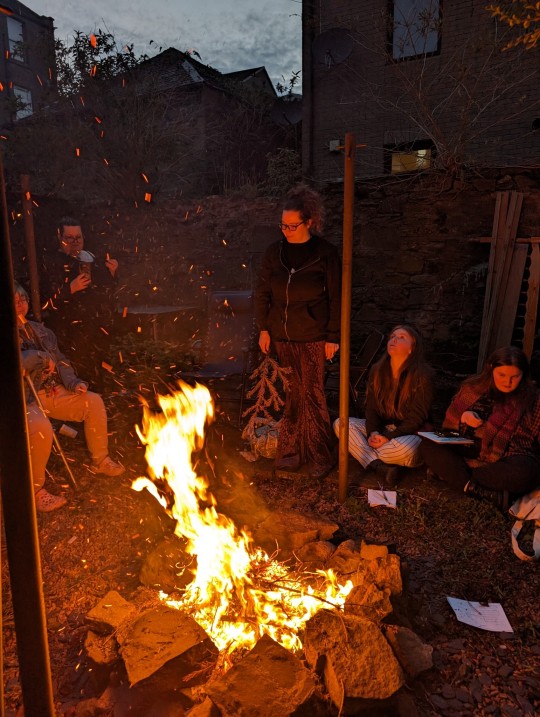
I have just arrived back in Scotland after a year of travel. So being able to celebrate Beltane with some friends was the perfect opportunity to reconnect with my surroundings and catch-up with the people close to me again.
Here's to an abundant summer!
#beltane#witchblr#witchcraft#celtic wicca#celtic#pagan#may day#scottish pagan#pagan witch#bonfire#2024#gaelic polytheism#scottish#baby witch#scottish witch#celtic witchcraft#folk witchcraft#paganblr
14 notes
·
View notes
Text
A Prayer to Rid Oneself of the Evil Eye
Original found (here)
Pagan altered version (here) by Morgan Daimler
In the Carmina Gadelica, a book of gaelic prayers, a prayer against the evil eye is found. It calls upon the strength of the natural world and the Lords three aspects.
Original Gaelic
SALTRAIM air an t-suil,
Mar a shaltrais lach air luin,
Mar a shaltrais eal air burn,
Mar a shaltrais each air uir,
Mar a shaltrais earc air iuc,
Mar a shaltrais feachd nan dul,
Mar a shaltrais feachd nan dul.
Ta neart gaoith agam air,
Ta neart fraoich agam air,
Ta neart teine agam air,
Ta neart torruinn agam air,
Ta neart dealain agam air,
Ta neart gaillinn agam air,
Ta neart gile agam air,
Ta neart greine agam air,
Ta neart nan reul agam air,
Ta neart nan speur agam air,
Ta neart nan neamh
Is nan ce agam air,
Neart nan neamh
Is nan ce agam air.
Trian air na clacha glasa dheth,
Trian air na beanna casa dheth,
Trian air na h-easa brasa dheth,
Trian air na liana maiseach dheth,
’S trian air a mhuir mhoir shalach,
’S i fein asair is fearr gu ghiulan,
A mhuir mhor shalach,
Asair is fearr gu ghiulan.
An ainm Tri nan Dul,
An ainm nan Tri Numh,
An ainm nan uile Run,
Agus nan
Cursa comhla
English translation
TRAMPLE upon the eye,
As tramples the duck upon the lake,
As tramples the swan upon the water,
As tramples the horse upon the plain,
As tramples the cow upon the 'iuc,'
As tramples the host of the elements,
As tramples the host of the elements.
Power of wind I have over it,
Power of wrath I have over it,
Power of fire I have over it,
Power of thunder I have over it,
Power of lightning I have over it,
Power of storms I have over it,
Power of moon I have over it,
Power of sun I have over it,
Power of stars I have over it,
Power of firmament I have over it,
Power of the heavens
And of the worlds I have over it,
Power of the heavens
And of the worlds I have over it.
A portion of it upon the grey stones,
A portion of it upon the steep hills,
A portion of it upon the fast falls,
A portion of it upon the fair meads,
And a portion upon the great salt sea,
She herself is the best instrument to carry it,
The great salt sea,
The best instrument to carry it.
In name of the Three of Life,
In name of the Sacred Three,
In name of all the Secret Ones,
And of the Powers together.
#resources#draoí#evil eye#irish paganism#celtic paganism#gaelic paganism#ireland#magic#draíocht#irish polytheism#celtic Christianity#folklore#folk magic#Scottish paganism#Scotland
35 notes
·
View notes
Text
As a pagan, and a very spiritual person.. i do NOT think its a coincidence that Alan Cumming played BOTH Loki AND Dionysus...


Something.. is VERY VERY wrong... 👀
youtube
youtube
#loki#lokean#about me#norse paganism#norse pagan#loki deity#godspouse#dionysus#dionysian#greek polytheism#hellenic gods#hellenic paganism#hellenic polytheism#scottish theatre#alan cumming#actor#signs#Youtube
5 notes
·
View notes
Text
Introduction
Hi there!
You can call me Bat.
It/Its pronouns.
My username is in Gaeilge (Irish) and means Fiery Trickster.
(was previously under the UN Gaelcryp)
TLDR;
I am: 27, queer, nonbinary, autistic, adhd, disabled, and a spoonie.
I am an Astrologer, based in Hellenistic Astrology. I do incorporate this into my practice. I am a cosmic folk hedge witch, with an emphasis on spirit work and am learning the folk traditions of the Appalachian, Irish, Scottish, and Swedish. I'm a Gaelpol, Lokean, and Animist. Actively learning decolonization, antifascism, abolitionism, anarchy and harm reduction. Covid Vigilant.
Please only follow if you are over 18, minors don't follow.
You are not in a safe space if you are a folkist or any other form of white supremacist, an informed appropriator(including Lilith devotees), racist, ableist, queerphobic, anti-Semitic, pro-Israel or a zionist, fatphobic, anti-masker (or just not masking bc u don't care anymore!), or harm apologist. Also note that I am Wicca Critical.
---------------------Long Version--------------------------
I have been a witch/magic practitioner for the past 6 or so years.
I practice mainly folk magic as of recently, focusing my studies on Appalachian, Irish, Scottish, Welsh and occasionally Swedish traditions.
I've been learning slowly about my ancestry and where my family comes from in order to both connect with my ancestors and venerate them, as well as learning about the places of my family's origin and their folk traditions. My family is heavily tied to the Appalachian regions, namely of North Carolina, Pennsylvania, Tennessee, and Georgia. A great many of them seem to have emigrated from Ireland, Scotland and Wales. Another subset of ancestors seem to have emigrated from Sweden and Germany.
That said, I'm also trying to learn about the land I live on currently in the Pacific NW and figure out how to practice the traditions of my homelands while I reside here and incorporate the land respectfully. I have felt homesick for Ireland since I was about 7 years old, and I've wanted to be involved in anything Irish I could find. I feel that the land Herself is calling me back, to the place where my ancestors called home. I'm trying to learn the language and hope that one day I will be able to, at the very least, visit for a long while.
I consider myself a hedge witch as well, not for the aspects of solitude but rather for the hedge-jumping/spirit-flight and focus on the Otherworld and spirit work. Connecting and communing with spirits has been a primary focus of my craft since the beginning.
As far as my beliefs go. I have been particularly focused on Gaelpol/Irish & Scottish Polytheism the past 4 or so years. (and now learning about Welsh) I am a Flame Keeper for Brighid, tending Her flame for 24 hours every 20 days. She is the goddess and deity that I have worshipped the longest, and felt a strong connection to first. Of the Tuatha De Danann, I also hope to form relationships with Donn, Lugh, Manannán mac Lir, Áine, and Aengus Og.
Within the past year I've also been connecting to Heathenry, through an unexpected connection to Loki. Though heathenry will not be a particular focus in my practice, I consider myself a Lokean and devotee of Loki and honor their family (partners and children) as well.
I use he/they/she pronouns for Loki, personally.
I am a strong Animist and have been, without the word, since I was very young. It is important to me to honor and get to know house spirits, land spirits, animal spirits, and plant spirts. I believe in fate and partial pre-determinism and that the planets give us signs through astrology. I believe electional astrology and astrologic magic are ways to work with the universe with some self-determinism. I believe in soul-transmigration and of course, the Otherworld. I believe in the soul having many parts - much like in Norse paganism.
As a disabled person, I am always on the hunt for things to make my practice more accessible. I also am hungry for community, as being inside all the time due to trying to stay safe from covid and just generally often being home-bound is so lonely.
As an ever-growing and changing person, I allow myself to morph and grow as I learn and experience more. So this post will likely be updated over time.
#about me#Introduction#Animism#Folk Magic#Witchcraft#Polytheism#Gaelic Polytheism#Gaelpol#Lokean#Heathenry#Norse Paganism#Spirit Work#Hedge Witch#Folk Witch#appalachian folk magic#Irish Folk Magic#Scottish Folk Magic#Swedish Folk Magic#Magick#Witchblr#Deity Work#Pagan#Hellenistic Astrology#Astrologer#Disabled Witch#Spoonie Witch#astrological magic#Cosmic witch#celestial witch#cosmic magic
3 notes
·
View notes
Text
Restarting my journey into paganism and would love to follow some people. Please interact with this post or follow me if you post about
Nature (reverence, conservation, etc)
Gaelic and/or Norse polytheism and mythology
Folk magic and witchcraft, herbalism 🍃🌿🍄
Pagan crafts
ABOUT ME
I’m 18+ and in the US.
I abhor racism, TERFs, and cultural appropriation.
I practice Norse and Scottish polytheism, but I am learning about others.
I primarily worship Freyja, Odin, and the Cailleach, among many others.
Also, I’ve got a ton of books that I’m reading or that are on their way to me, so I’ll try to post about them.
#paganism#celtic paganism#sorry for using that term - I know those cultures are not homogeneous#witchblr#scottish paganism#scottish polytheism
17 notes
·
View notes
Text
just sharing this lovely article about Scottish Saining
15 notes
·
View notes
Text
Okay.
So, I was researching about Scottish folk practices when I stumbled upon a reddit thread about smudging. Specifically, OP was wondering if they could practice smudging if they grew their own sage. The replies were surprisingly positive and supportive.
Now, my own take on this may be controversial: if you practice anything from a culture not your own with good intentions and a pure desire to learn the old ways as they are taught within that community, rather than a bastardized white-washed version of it, then I think that's good. Admirable in some cases. If certain traditions aren't taught to someone–anyone!–those traditions are certain to die out. And if someone is approaching those traditions in good faith and deep respect for that culture, then why not teach them? And directly from the source so that they may learn better, as opposed to playing telephone with outdated or romanticized books. That's my personal take.
But within that thread, I saw this reply:

And something rubbed me the wrong way about they said "my ancestors used to sain (their term for smoke cleansing)". A few things rubbed me the wrong way, actually.
First, let's clear up what saining means and where it comes from.
The Cailleach's Herbarium talks about saining in an excellent article, link here, that mentions the meaning of the word sain: "The etymology of the word Sain is worth noting. Sain comes from Middle English (whence also English sain) and is found in the Scots language as Sain. Cognate to the Scottish Gaelic word Seun (“a charm”). Sain can mean to bless or consecrate and make the sign of the cross."
They go on to explain that saining can take many forms, such as the traditional smoke cleansing, fire cleansing (as is seen in many Celtic traditions and myths), and water cleansing (or lustration).
Basically, sain is a charm, usually used for protection and cleansing. It is not truly comparable to smudging, a term commonly associated with Native American traditions. And even that term is an English word dating back to the 16th century: "The smudge meaning "make a smoky fire" is by 1860, also of unknown origin, but perhaps related. According to OED now dialectal and North American. OED also gives it in an earlier, obsolete sense of "to cure (herring) by smoking" (1590s).The related noun smudge is attested by 1767 as "a suffocating smoke" (to repel mosquitoes, etc.); from 1806 as "heap of combustibles ignited and emitting dense smoke." Hence smudge-pot (1903). Smudge-stick as a Native American (Crow tribe) artifact is by 1908"
...which doesn't clear anything up about its origins, really. The smoke purification practices of the Native Americans is varied depending on tribe and their individual beliefs, with words that also vary by language and dialect. Basically, smudge is an English catch-all term for smoke purification processes...which is why I have to laugh when people split hairs over the use of the word, assuming it applies to all Native Americans, which, frankly, is also an English catch-all term for the numerous tribes of indigenous peoples in North America.
Some people are perfectly comfortable conflating one term with a whole ass practice and holding that as the be all end all term for said practice, while on the other hand, those same people will take a word for a very specific thing, and use that as a a catch-all term for contemporary practices to the other word. At best, it's confusing as fuck. At worst, it's muddling not one, but TWO similar yet still very different cultural practices.
In fact, I'll take it a step further: if you follow a Native American tradition or spiritual path, try to learn what the specific word is for your smoke purification ritual(s), and start using that word (if you are allowed within your practice) in lieu of the term "smudging". That goes for other practices that take part in smoke purification. Own your culture, own your traditions! Don't dumb down your practice for the sake of outsiders who don't care or fully understand those practices. You deserve better. Your fellow practitioners deserve better. Your culture deserves better. The ancestors who laid the groundwork for these traditions deserve better. Honor yourself, honor them all.
#Scottish witchcraft#Scottish folk magick#Scottish syncretism#Scottish animism#Sain#Saining#Gaelic Polytheism
5 notes
·
View notes
Text
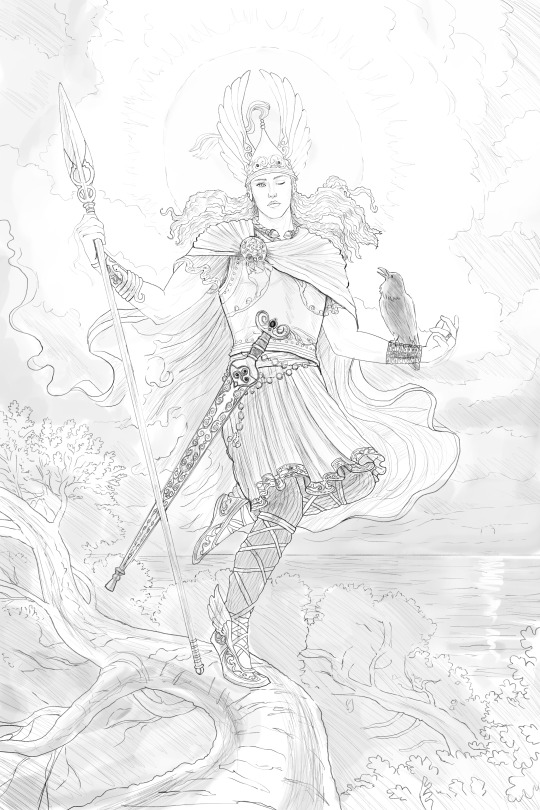
Lugh
#celtic#pagan#paganism#scottish#irish#celtic mythology#illustration#art#fantasy#drawing#lugh#lughnasa#heathen#tradition#european#god#gods#polytheism#celtic polytheism#myth#mythology#ireland#scotland#artists on tumblr
88 notes
·
View notes
Text
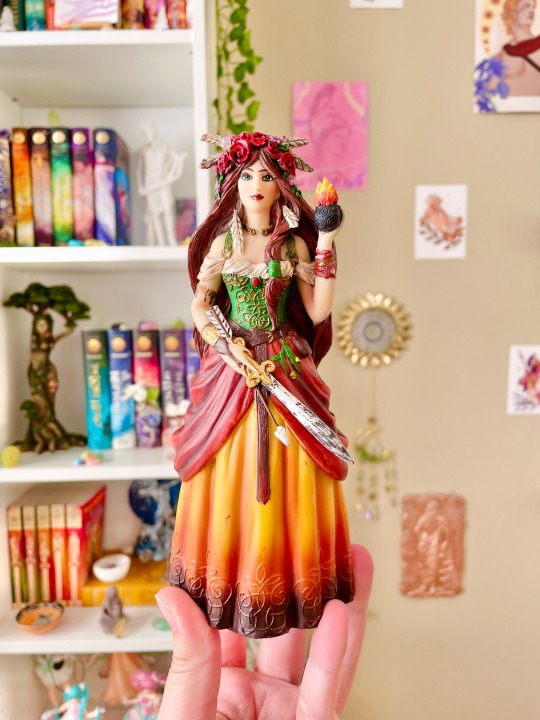

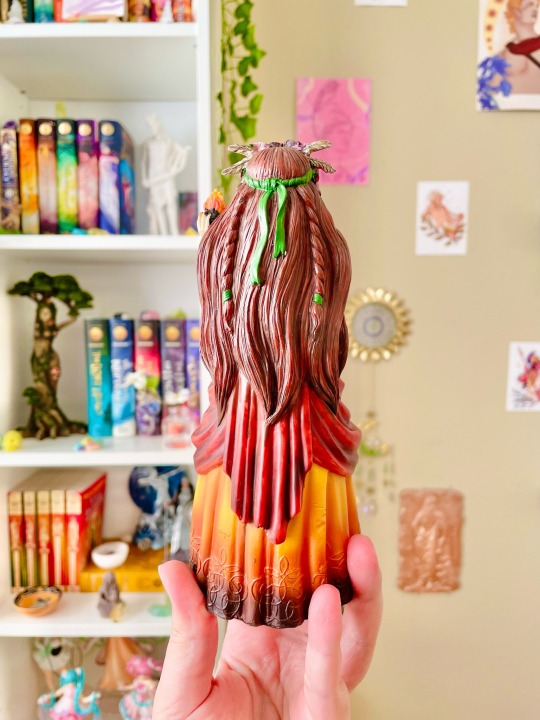
My first Brigid piece! I never really intended to work with gods from other pantheons, but I felt extremely pulled to an image of Brigid in a deity book and knew I needed to work with her. In a way, it feels right because it connects me to my Scottish heritage, something that I think Brigid knew I needed the push to honor properly 🔥
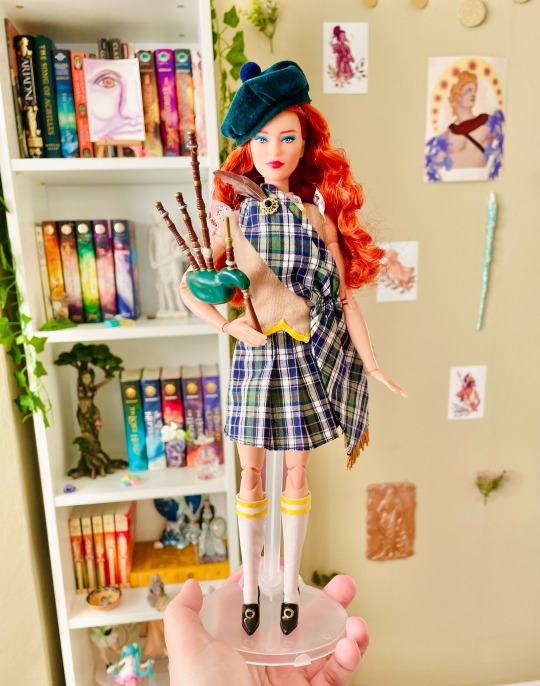
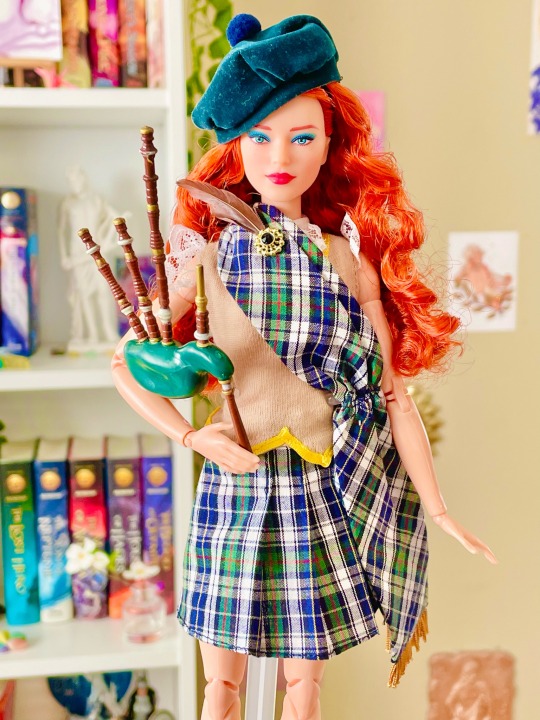
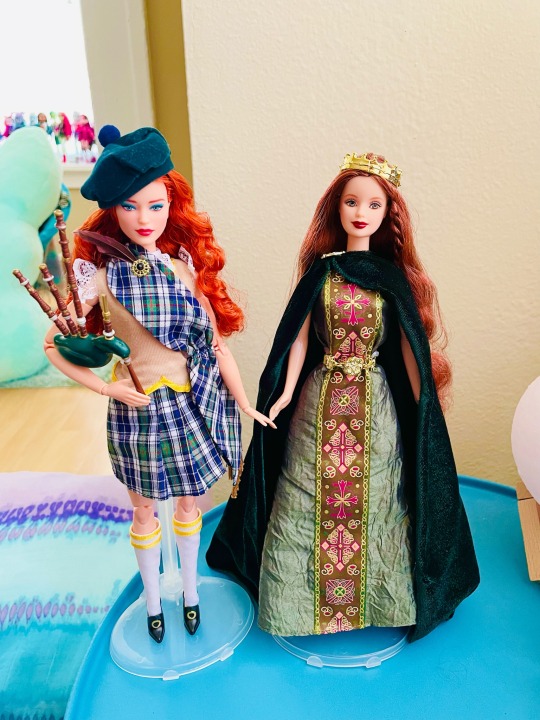
I also put together this Scotland Barbie (pictured next to the Princess of Ireland Barbie that I picked up quite awhile back) because I really wanted a Scottish doll but didn’t want to pay for the actual one 😂 I love how this one turned out, and I’m thinking of incorporating both of these onto the altar that I plan on putting together for Brigid.
#brigid#bride#celtic paganism#Scottish#Scotland#hellenic polytheism#hellenism#paganism#witchcraft#barbie#Ireland
0 notes
Note
How did you learn so much about Irish polytheism? I feel like I can barely find any people to follow or resources for it compared to stuff like Hellenic or Norse polytheism. Or it’s lumped in with other Celtic polytheistic paths. Who would you recommend to follow / any books / websites? (Btw I totally understand if you’ve already answered this and choose not to! Tumblr is just being weird and nothing shows up when I search your blog for like any tags!)
Hello!
I've been doing this for over 10 years now, and it's taken me a long time to accumulate the knowledge that I have - which, admittedly isn't hugely extensive as it is.
You'll often find various Celtic polytheistic paths lumped together because, although fundamentally distinct from one another, they share a lot too. There are deities and spirits, creatures and legends and stories that are shared through the mixing of people. It can be frustrating to wade through it all, I know.
Here are some of the resources I’ve used over the years:
LINKS:
Mary Jones Celtic Literature Collective.
A Masterpost of Resources for IriPols That is Very Extensive and Helpful.
A List of Deities (the drop-down option does state Gaelic, so it’s Irish and Scottish).
BOOKS:
Celtic Myths and Legends by Peter Berresford-Ellis.
Dictionary of Celtic Mythology by Peter Berresford-Ellis.
Early Irish Myths and Sagas by Jeffrey Gantz.
The Ancient Celts by Barry Cunliffe.
The Old Gods of Ireland: The Facts about Irish Fairies by Patrick Logan.
Ireland’s Immortals: A History of the Gods of Irish Myth by Mark Williams.
Ortha Nan Gaidheal: Carmina Gadelica [in English and Irish] by Alexander Carmichael.
Pagan Portals - Irish Paganism: Reconstructing Irish Polytheism by Morgan Daimler.
If I can find or remember more, I’ll add them to this for you.
282 notes
·
View notes